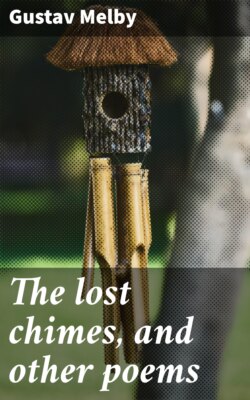Читать книгу The lost chimes, and other poems - Gustav Melby - Страница 9
На сайте Литреса книга снята с продажи.
XIII
ОглавлениеTable of Contents
On Danube’s shores, ’mid wooded hills, a villa
Was smiling welcome to its lord and guest,
But most of all to her—whose name was Stella,
(Her father called her “pulchra me’ puella”)
For whom the servants ready had ein Fest,
Where once encamped the hosts of Attila.
A Florentine among Teutonic scenes,
Led thither by a love, yet unexpressed,
Forgot his sorrows, yea, forgot his bells,
Since nought like love its victim so compels
To full submission to a sweet behest,
The looks and smiles of one still in her teens.
Her beauty was the centre of all scenes,
Her voice the only music of each sound,
Her presence, sole embodiment of bliss,
And heaven itself it would have been, a kiss,
For which the Shibboleth he had not found,
Behind the garden-trees and flow’ry screens.
On horseback did they sometimes ride along
The winding roads, and most in early morn,
While yet the dew was trembling on the blade,
And all the minstrelsy of dreamy glade
Was like a stream Elysian to them borne,
With pure delight, estranged to earthly wrong.
And sometimes on the noble river’s breast
They sailed, below the stately castle walls,
Or hoary ruins on o’erhanging cliffs,
Of ancient lore the sacred hieroglyphs,
Upon whose mystery the moonlight falls,
With fairy-charm which age of knighthood blessed.
’Mongst such are those of famous Dürrenstein
Which once imprisoned Richard Lionhearted,—
Returning from a holy pilgrimage,—
The English lion in an unknown cage,—
For ev’n his minstrel, from whom he had parted,
Knew not what walls his good lord did confine.
But he, the faithful Blondel, sought him long,
And traveled in disguise through Germany,
Until he learned of some great personage,
On whom king Leopold had wreaked his rage,
And now he sought this place most eagerly,
Without an aid or weapon, but a song.
A song which he, together with the king,
Had made one night among Judean hills,
A ballad full of stirring battle-scenes,
Of Crusaders in strife with Saracens,
Of victories, defeats and untold ills,
And this below the tow’r he now did sing.
And in the stillness of the summer night
His voice rose clear up to the battlement,
But none did deem it but a common lay,
Except the one who watched a flick’ring ray
Of one bright star, to him the song’s ascent
Came like God’s angels on the gleam of light.
He reached the middle of his song and ceased,
Then harkened for an answer from the tow’r,
When all at once he heard his master’s voice
Conclude the lay, it made his heart rejoice.
He homeward sped, and soon a ransom’s power
The monarch from captivity released.
This story Stella told the Florentine,
Who found it charming in her quaint Italian,
But would have substituted some fair lady
For doughty Richard, though perhaps more shady,
If held a ransom by a noble villain,
Found by her lover while she did repine.
A thing she disagreed with very strongly,
Since heroes she preferred to amorettes,
And poets, singing monarchs out of prison,
To luting minstrels whose life’s mission
Is sentimental ditties and regrets,
Though she in heart felt this was stated wrongly.
And such is, after all, a maiden’s heart,
Unknown to her, unsearchable to man,
It quotes one thing, while feeling quite another,
Though guileless like a sister to her brother,
Her head and heart are like a sprightly span
Of untrained colts which ever pull apart.
But we must shun continuous digression,
And turn to him, the hero of our tale,
Who made the rather sad discovery,
That Stella ne’ertheless did worship Chivalry,
But not in men of fifty, though all hale,
For he received a “No” to his confession.
Her heart cleaved to a youth in far off land,
A youth of prowess in her country’s cause,
Though not bethrothed, she hoped the day would come,
When that should be, ev’n in her father’s home,
This to Sordino a great sorrow was,
Since he had hoped to win her heart and hand.
He said adieu to these his friends, by chance,
And drew away, he cared but little whither,
Since wounded love has lost its grip on life,
And sees it like a night with horror rife,
Until the victim on some morning blither,
Does damn such meetings as that one in France.
For men at fifty may as truly love,
As boys of fifteen, and a little truer,
And, disappointed, feel the keenest pang,
But yet I have not heard a suitor hang
Himself, because he flatly failed to woo her,
Nor worth the while with rivals, have a row.
For wisdom grows with years, and manly reason
Becomes the load-star of the wanderer,
And man doth cease to be a woman’s slave,
For which she may despise him as a knave;
The “superman” she made, doth ponder her,
And knows, beneath her love is sometimes treason.
